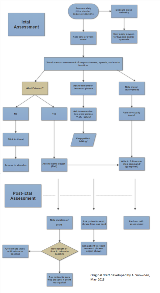Standardization of Ictal Cognitive Assessment in the Epilepsy Monitoring Unit
Abstract number :
2.407
Submission category :
15. Practice Resources
Year :
2018
Submission ID :
501261
Source :
www.aesnet.org
Presentation date :
12/2/2018 4:04:48 PM
Published date :
Nov 5, 2018, 18:00 PM
Authors :
Ashley Snowden, VCU Health and Victor Gonzalez Montoya, VCU Health
Rationale: Through a preliminary literature review, a single nationalized protocol for ictal cognitive assessment in an epilepsy monitoring unit (EMU) was not found. The assessment of seizures is a fundamental job role of the EMU staff, and this quality improvement project aims to create a standardized assessment strategy which can become the basis of ictal cognitive assessment for patients in this specialty unit. Events in the EMU are captured both on recorded video as well as continuously monitored electroencephalogram (EEG), these recordings paired with nursing or electroneurodiagnostic (END) technician ictal cognitive assessment can elicit useful data for diagnosis, characterization, localization, and/or surgical planning in the treatment of seizures or epilepsy. Specifically, ictal cognitive assessment can elicit pertinent data in reference to level of responsiveness, language and motor function, or subtle lateralizing signs which could be difficult to convey via video. This assessment tool should be used for all patients undergoing intensive seizure monitoring, and can assist in diagnosis and/or medical/surgical management of epilepsy as well as psychogenic non-epileptic seizures (PNES). Faster recognition of PNES events can expedite the diagnosis and provide cost savings to the organization through decreased high-cost healthcare utilization. Furthermore, standardized assessment can be used to assist in medical/surgical management for patients with epileptic seizures ultimately leading to improvements in quality of life from a decreased seizure burden. Methods: This quality improvement project was structured utilizing the Institute for Healthcare Improvement's (IHI's) Plan-Do-Study-Act (PDSA) model. An extensive literature review was conducted to find the best evidence supporting a standardized ictal cognitive assessment tool, however, no such tool was found. A collaborative team was recruited with practitioners representing the disciplines of EMU nursing, adult and pediatric neurology, nursing leadership, and END technicians. The interdisciplinary group evaluated literature as well as tools implemented at other level 4 epilepsy centers, and collectively devised a preliminary algorithm for EMU staff to implement ictal cognitive assessment. The algorithm underwent multiple revisions before the team reached a consensus on the usefulness and feasibility of the tool. The tool has been implemented in its current state (attached image) and continues to be evaluated under the PDSA model. Results: A preliminary draft of a standardized ictal cognitive assessment tool has shown feasibility for implementation in the EMU. Data collection is in progress to compare post-implementation results to baseline length of stay, volume of patients admitted over time, safety events related to seizure activation, and efficacious seizure testing performed by clinicians in the EMU. Conclusions: Although data collection is still underway, a standardized ictal cognitive assessment tool is believed to consistently elicit useful data in diagnosis and management of epilepsy or PNES. Through utilization of a standardized tool, any clinician is able to provide a comprehensive assessment of language and motor function as well as lateralizing signs despite their experience in working with epilepsy patients. This point is particularly important when nurses are "floating" to the unit from varying clinical units and educational backgrounds. Ultimately, standardization of ictal cognitive assessment is believed to support both quality and safety outcomes as well as cost containment in the EMU. Funding: No funding was received in support of this abstract.
